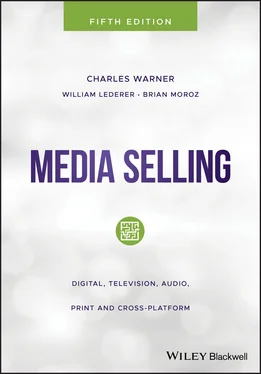Why Are Ethics and Rules Important?
With heightened press coverage of corporate, Wall Street, government, and political scandals, the public has become increasingly concerned about the ethical behavior of the representatives of our important institutions. Therefore, if ever there was a time when ethical behavior for business and for salespeople was important, it is now. And it is vital to the health and credibility of American business to do the right thing rather than to do things right. Companies should perceive ethical behavior and doing the right thing as enlightened self‐interest because they preserve a company’s long‐term reputation, which is its greatest asset.
Doing the right thing and being trustworthy is not only the top priority for companies, but also for leadership. If salespeople want to get promoted and eventually be in a leadership position, they must be trustworthy. Adam Bryant, who wrote the weekly Corner Office column for The New York Times, interviewed 525 CEOs over the years for the column. In October of 2017, Bryant wrote a final column titled “How to be a C.E.O., from a decade’s worth of them.” In the column he wrote, “if you were to force me to rank the most important qualities of effective leadership, I would put trustworthiness at the top.” 9 He goes on to write:
We all have a gut sense of our bosses, based on our observations and experiences: Do we trust them to do the right thing? Will they be straight with us and not shave corners of truth? Do they own their mistakes; give credit where credit is due; care about their employees as people as opposed to assets? 10
If you substitute “customers” for “employees” in the last sentence, you have excellent guidelines for ethical behavior for media salespeople and their bosses.
Five Ethical Responsibilities for Media Salespeople
1. Responsibility to consumers
As defined in Chapter 1, consumers use a product and the consumers of the media are the audiences – users, readers, viewers, listeners, or subscribers.
In 2018 the information industry credibility hit an all‐time low, according to the Center for Media Research. 11 Criticism of fake news came from all sides of the political spectrum, especially from the right. So to avoid being labeled fake news and to attract audiences desirable to advertisers, the media must put the needs of the majority of its consumers first. If a media outlet does not put the interests of its consumers or audience first, the audience will eventually gravitate to sources of information and entertainment that do. If a media outlet does not tell the truth, withholds important information from consumers, sells shoddy products, or erodes consumers’ values and sense of self‐esteem, these consumers will eventually turn to information, entertainment, and opinion sources that provide what they want, what they agree with, and that they find truthful, useful, interesting, and convenient.
Audiences want something in which they can believe. Therefore, the media should not transmit false or misleading news or advertising. General rules for media salespeople should include not accepting advertising for products that are unsafe. People do not like to be deceived, especially by the media. Thus, when a medium lies to its audience and loses its credibility, it eventually loses its audience, and can no longer be advertiser supported. Putting the consumers first is at the heart of the marketing concept, and is the essence of ethical behavior in the media.
In 2017 Facebook hired 8,500 people to manually review content that had been rejected for publication by Facebook’s algorithms. Facebook also changed its algorithms in its News Feed to show users fewer news items and more personal items. Facebook made these changes because Facebook users, critics in the media, and critics in the government were concerned about fake news, and Facebook wanted to regain the trust of users, critics, and politicians. Facebook’s attempts to address the problem of fake news without government passing restrictive regulations was an example of an important medium where people get a large portion of their news self‐regulating, of putting the needs of consumers first, before its own need for profits.
2. Responsibility to their conscience
All salespeople are responsible to themselves for doing what they believe is good or bad, right or wrong, and is based on their own conscience or moral standards. John Wooden, the legendary UCLA basketball coach, said that there is no pillow as soft as a clear conscience. Purposely acting unethically will erode a salesperson’s self‐esteem. By acting ethically, salespeople increase their self‐esteem, self‐image, and self‐confidence and do the same for their company. By acting ethically, salespeople develop a long‐term perspective, which benefits their mental health and their company as well as the customers and consumers.
Unfortunately, some salespeople and sales organizations are more motivated by greed, in making money or “getting the stock price up,” than in building a highly respected personal or company reputation. Such greed inevitably produces cheating, which is a cancer that erodes a person’s or a company’s reputation and eventually will kill the company. Those who conduct business unethically know they are doing so, but they continue doing the wrong thing because they believe they will not get caught. However, they are playing an ethical lottery in which the odds of being discovered are high, as we saw with Enron and Harvey Weinstein. Practicing ethical behavior every business day is the only sure way of maintaining a reputation, and self‐esteem grows as the result.
3. Responsibility to customers
Customers (advertisers) do not buy from or partner with media companies and salespeople they do not trust. Thus, media salespeople should concentrate on building trust and managing relationships for the long term, not merely selling for a one‐shot deal. Salespeople must underpromise and overdeliver.
Customer‐oriented rules for media salespeople – the Don’ts
Don’t lie to advertisers.
Don’t sell anything that customers do not truly need.
Don’t allow clients to feel like they lost in a negotiation (“Leave something on the table.”) 12
Don’t be unfair to advertisers.
Don’t sell something customers cannot afford.
Don’t use bait‐and‐switch tactics (selling something that they know is not available just to get the money in the door).
Don’t recommend or accept advertising that is in bad taste or that will harm a client’s image.
Don’t accept false or misleading advertising.
Don’t give kickbacks (a euphemism for bribes) to customers. Kickbacks often come in the form of unauthorized rebates or other cash payments given by salespeople from their own pockets. Kickbacks are illegal, and there are serious consequences to violating the law, including fines and imprisonment.
Rules for media salespeople – the Dos
Do represent your clients. Media salespeople’s responsibility is to publish the best possible advertising for their clients and to try to get the clients the best, fairest deal they are entitled to according to a medium’s official pricing and positioning policies. Salespeople should be their client’s advocates inside their organizations.
Do keep privileged information confidential. Salespeople must keep privileged information to themselves, including details about advertisers’ strategy, budgets, creative plans, special sales, and media plans until the campaign has broken and the information is readily available from outside sources. When a client or advertising agency requests competitive information, salespeople should not give it out before the campaign starts. If salespeople have done their selling job properly, they have sold themselves as solutions providers, which implies a privileged relationship, such as that between a doctor and patient. Customers have a right to assume that salespeople are experts whose recommendations are given with their customers’ best interests in mind.
Читать дальше












